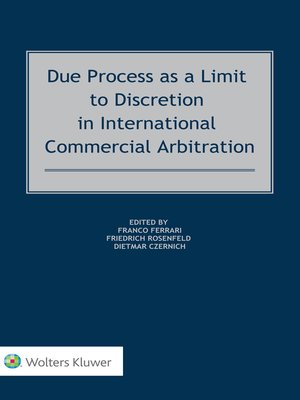Due Process as a Limit to Discretion in International Commercial Arbitration
ebook
By Franco Ferrari

Sign up to save your library
With an OverDrive account, you can save your favorite libraries for at-a-glance information about availability. Find out more about OverDrive accounts.
Find this title in Libby, the library reading app by OverDrive.



Search for a digital library with this title
Title found at these libraries:
| Library Name | Distance |
|---|---|
| Loading... |
The absence of a coherent body of case law on due process has increasingly motivated recalcitrant parties to use due process as a strategic tool, thereby putting at risk the prospect of obtaining an enforceable award in expeditious proceedings. Countering this inherent danger, here for the first time is a comprehensive study on due process as a limit to arbitral discretion, showing how due process applies in practice in key jurisdictions around the world.
Based on country reports prepared by leading arbitration practitioners and academics, the book explores how courts in major arbitration jurisdictions apply due process guarantees when performing their post-award review. The contributors, driven by an interest in exploring the interplay between due process and efficiency, focus on those due process guarantees that set limits to arbitral discretion. Matters covered include the following:
An introductory general report thoroughly analyses the normative basis of due process and its interplay with party autonomy, as well as applicable standards of review and commonalities among manifestations of due process across jurisdictions.
A signal contribution to the debate regarding the so-called due process paranoia affecting arbitral tribunals – a topic relevant in every single arbitration proceeding – this book provides practical guidelines on how to maintain the balance between due process and efficiency and how to apply due process and counteract its misuse in arbitration proceedings. It will be welcomed by counsel, arbitrators, and judges from all countries, as well as by academics and researchers concerned with international commercial arbitration.







